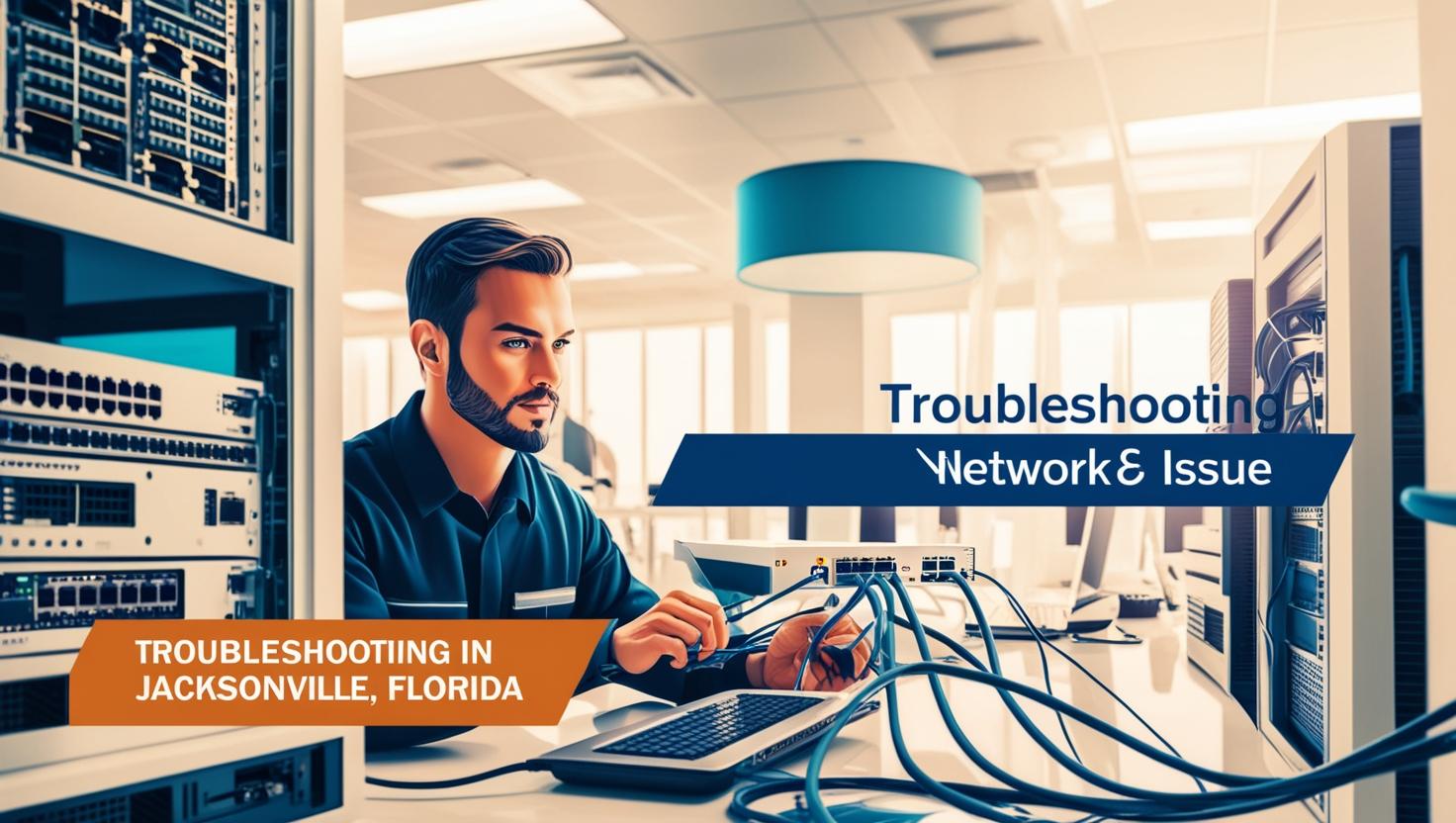Jacksonville is a large city with many businesses, schools, and homes using computers every day. People depend on the internet and networks to complete work, study, and communicate. However, sometimes there are problems with computer networks that can slow down or stop work completely. These issues can be caused by many different things, including hardware failures, software problems, or internet service interruptions.
Common Network Problems in Jacksonville
Slow Internet Speeds
One of the biggest network problems in Jacksonville is slow internet speed. People often complain that their internet is not fast enough to stream videos, attend online meetings, or download important files. Slow speeds can be caused by too many users on the network, problems with the internet service provider (ISP), or outdated equipment.
Connection Drops
Another major issue is when internet connections suddenly stop. This can happen at home, in offices, or in schools. A connection drop can be caused by a weak Wi-Fi signal, faulty routers, or problems with the ISP. When the connection stops, people may lose important work, online meetings may end suddenly, and frustration increases.
Network Congestion
Jacksonville has many businesses, restaurants, schools, and public places where people use the internet at the same time. When too many people use the same network, it can become slow and difficult to use. This problem is called network congestion. It happens a lot in places like coffee shops, shopping centers, and office buildings where Wi-Fi is shared.
Hardware Failures
Computers, routers, modems, and cables help create a strong network, but they can sometimes stop working. In Jacksonville, many businesses face network issues due to broken equipment. If a router stops working, no one in the office can connect to the internet. If a network switch fails, all computers in a business may lose connection.
Cybersecurity Issues
Cyberattacks and hacking are becoming bigger problems in Jacksonville. Hackers try to steal personal and business information through phishing emails, malware, and other attacks. If a network is not secure, important data can be stolen, leading to financial loss and privacy issues.
Outdated Systems
Some businesses and homes in Jacksonville use old computers and network devices. Older systems may not be able to handle high-speed internet or support modern security updates. This can cause slow speeds, frequent crashes, and a higher risk of cyberattacks.
Causes of Network Issues in Jacksonville
Internet Service Provider Problems
Sometimes, the problem is not with personal devices or office networks but with the ISP itself. Companies like AT&T, Xfinity, and Spectrum provide internet services in Jacksonville. If their servers go down or experience heavy traffic, customers will experience slow or no internet.
Weather Conditions
Jacksonville experiences storms, hurricanes, and heavy rain, which can damage internet cables and network equipment. Flooding or strong winds can also affect Wi-Fi signals and mobile networks. During extreme weather conditions, many people lose internet access until repairs are made.
Poor Wi-Fi Coverage
In many homes and offices, the Wi-Fi signal does not reach all rooms. Walls, furniture, and electronic devices can block Wi-Fi signals, making the internet weak in some areas. People often struggle with this issue in large buildings, warehouses, and schools.
Too Many Devices on the Network
With more people using smart devices, networks are under more pressure. In Jacksonville, homes and offices often have many devices connected at the same time, including computers, smartphones, tablets, and smart TVs. Too many connected devices can slow down the network.
Solutions to Network Issues
Upgrading Equipment
One way to improve network performance is by upgrading old routers, modems, and computers. Newer devices are designed to handle high-speed internet and have better security features.
Using Wired Connections
While Wi-Fi is convenient, wired connections are often more stable. Using Ethernet cables instead of Wi-Fi can reduce connection drops and improve speed, especially in offices and businesses.
Securing Networks
To prevent cyberattacks, it is important to use strong passwords, enable firewalls, and install antivirus software. Businesses in Jacksonville should train employees on cybersecurity practices to protect sensitive data.
Contacting Internet Providers
If the internet is slow or keeps disconnecting, customers should contact their ISP. Sometimes, ISPs can fix the issue remotely or send a technician to check for problems.
Limiting Network Usage
Reducing the number of devices connected to the network can help improve speed. Businesses and households can set limits on non-essential internet use during work hours to prevent slowdowns.
Installing Wi-Fi Extenders
For large homes and offices, Wi-Fi extenders can help boost the signal. These devices ensure that all areas have a strong connection, reducing dead zones.
Importance of Reliable Networks in Jacksonville
For Businesses
Businesses rely on strong networks to process transactions, communicate with customers, and store data. Any downtime can lead to financial loss and frustration among employees and clients.
For Schools
Many schools in Jacksonville use online learning tools and digital classrooms. A poor network can disrupt lessons and make it hard for students to complete assignments.
For Homes
With more people working from home, a stable internet connection is essential. Families also use the internet for streaming, gaming, and communication. A weak connection can be very frustrating for everyone at home.
For Healthcare Facilities
Hospitals and clinics use networks to store patient records, communicate with other doctors, and operate medical devices. Network issues in healthcare facilities can lead to serious problems and delays in treatment.
Future of Networks in Jacksonville
With the growth of technology, Jacksonville is expected to see better network infrastructure in the future. Faster internet speeds, stronger cybersecurity measures, and more reliable services will help businesses, schools, and homes stay connected. However, staying aware of potential network problems and solutions will always be important.
